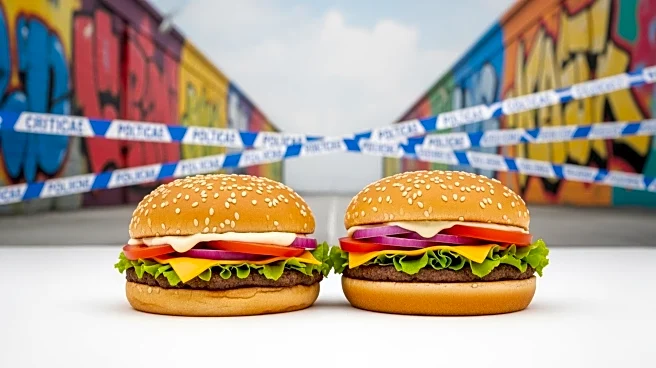What's Happening?
McDonald's Japan has announced a collaboration with the iconic video game franchise Street Fighter, introducing a series of specialty burgers inspired by the game. The promotion includes a teriyaki burger with an egg, a sweet and sour fried chicken sandwich,
and a triple cheeseburger, each themed around characters from Street Fighter II. The collaboration was unveiled with a retro-style promotional video reminiscent of the SNES era, aiming to attract both fast food enthusiasts and gaming fans. The burgers will be available for a limited time starting next week, alongside themed beverages such as the 'Overflowing Energy' McFizz and a McFloat with soft-serve ice cream. This initiative is part of a broader marketing strategy to engage customers through nostalgia and popular culture.
Why It's Important?
The collaboration between McDonald's Japan and Street Fighter highlights the growing trend of cross-promotional marketing strategies that leverage popular culture to boost consumer engagement. By tapping into the nostalgia associated with classic video games, McDonald's aims to attract a diverse customer base, including gamers and fans of the franchise. This move could potentially increase foot traffic to McDonald's outlets in Japan, driving sales and enhancing brand visibility. Additionally, it underscores the influence of video game culture in mainstream marketing, reflecting a shift in how brands connect with younger audiences. The promotion may also inspire similar collaborations in other regions, as companies seek innovative ways to capture consumer interest.
What's Next?
While the Street Fighter-themed burgers are currently exclusive to Japan, the success of this promotion could lead to similar initiatives in other markets. McDonald's may consider expanding the collaboration to include more international locations, depending on consumer response and demand. Additionally, the partnership could pave the way for future collaborations with other popular franchises, further integrating gaming culture into fast food marketing strategies. As the promotion unfolds, it will be interesting to observe consumer reactions and whether this approach influences McDonald's global marketing tactics.
Beyond the Headlines
This collaboration raises questions about the ethical implications of using popular culture to market fast food, particularly in terms of health and consumer behavior. While the promotion is designed to be fun and engaging, it also highlights the ongoing debate about the role of fast food in contributing to unhealthy eating habits. Furthermore, the use of video game characters in marketing may influence younger audiences, prompting discussions about responsible advertising practices. As brands continue to explore innovative marketing strategies, balancing consumer engagement with ethical considerations will remain a critical challenge.















